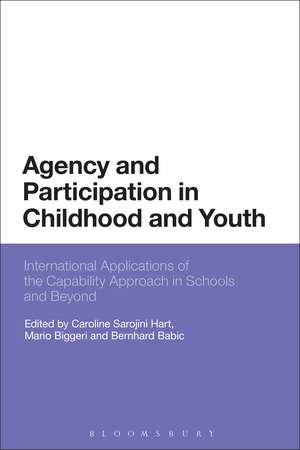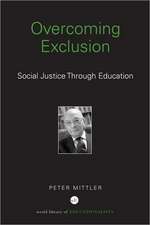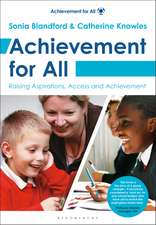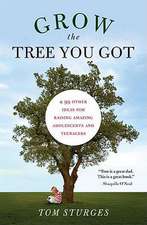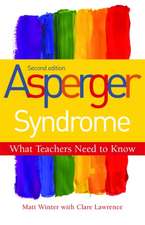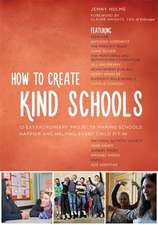Agency and Participation in Childhood and Youth: International Applications of the Capability Approach in Schools and Beyond
Editat de Dr Caroline Sarojini Hart, Professor Mario Biggeri, Bernhard Babicen Limba Engleză Hardback – 26 feb 2014
| Toate formatele și edițiile | Preț | Express |
|---|---|---|
| Paperback (1) | 258.59 lei 43-57 zile | |
| Bloomsbury Publishing – 26 aug 2015 | 258.59 lei 43-57 zile | |
| Hardback (1) | 775.02 lei 43-57 zile | |
| Bloomsbury Publishing – 26 feb 2014 | 775.02 lei 43-57 zile |
Preț: 775.02 lei
Preț vechi: 991.18 lei
-22% Nou
Puncte Express: 1163
Preț estimativ în valută:
148.35€ • 161.19$ • 124.69£
148.35€ • 161.19$ • 124.69£
Carte tipărită la comandă
Livrare economică 21 aprilie-05 mai
Preluare comenzi: 021 569.72.76
Specificații
ISBN-13: 9781472514875
ISBN-10: 1472514874
Pagini: 296
Dimensiuni: 156 x 234 x 23 mm
Greutate: 0.59 kg
Ediția:New.
Editura: Bloomsbury Publishing
Colecția Bloomsbury Academic
Locul publicării:London, United Kingdom
ISBN-10: 1472514874
Pagini: 296
Dimensiuni: 156 x 234 x 23 mm
Greutate: 0.59 kg
Ediția:New.
Editura: Bloomsbury Publishing
Colecția Bloomsbury Academic
Locul publicării:London, United Kingdom
Caracteristici
Develops new theoretical and practical applications of the capability approach to enhance child and youth agency and participation
Notă biografică
Caroline Sarojini Hart is Senior Lecturer in Education at Sheffield Hallam University, UK, and Affiliated Lecturer in Education at the University of Cambridge, UK.Mario Biggeri is Associate Professor of Development Economics at the University of Florence, Italy. Bernhard Babic is an independent social development consultant and researcher, and Senior Project Manager for Caritas, Germany.
Cuprins
Introduction, Caroline Sarojini HartPart I: Agency and Participation in Childhood and Youth 1. The Capability Approach and Educational Research, Caroline Sarojini Hart (Sheffield Hallam University, UK)2. Education Policy for Agency and Participation, Mario Biggeri (University of Florence, Italy)3. The Capability Approach and Children's Rights, Daniel Stoecklin (Institut Universitaire Kurt Bosch, Switzerland) and Jean-Michel Bonvin (School of Health and Social Work, EESP (École d'Études Sociales et Pédagogiques), Switzerland)4. Agency, Participation and Youth Inequalities, Zoe Clark (Bielefeld University, Germany)5. Child Poverty from a Capability Perspective, Ortrud Lessmann (Helmut-Schmidt-Universität, University of the Federal Armed Forces, Germany)Part II: Developing Agency and Capabilities in Schools and Beyond6. Pedagogies to Develop Children's Agency in Schools, Marina Santi (University of Padova, Italy) and Diego Di Masi (University of Padova, Italy)7. Education and the Capabilities of Children with Special Needs, Christina Devecchi (University of Northampton, UK), Richard Rose (University of Northampton, UK) and Michael Shevlin (Trinity College, Dublin)8. Evaluating Children's Capabilities Enhancement in Schools, John Schischka (Christchurch Polytechnic University of Technology, New Zealand)9. Agency, Participation and Transitions Beyond School, Caroline Hart (Sheffield Hallam University, UK)10. School Enrolment and Child Labour, Zina Nimeh (Maastricht University, Netherlands) and Robert Bauchmuller (Maastricht University, Netherlands) 11. Children's Autonomy in Conflict-Affected Countries, Jérôme Ballet (UMI Résiliences), Claudine Dumbi (Higher Institute of Agro-Veterinary Science, Kimwenza) and Benoit Lallau (University of Lille, France)12. Youth Participation outside the Classroom, Vittorio Iervese (University of Modena and Reggio Emilia (UNIMORE), Italy) and Luisa Tuttolomondo (University of Modena and Reggio Emilia (UNIMORE), Italy)Concluding Remarks, Caroline Sarojini Hart (Sheffield Hallam University, UK), Mario Biggeri (University of Florence, Italy), Bernhard Babic (Caritas, Germany) and Clemens Sedmak (King's College London, UK)Subject IndexAuthor Index
Recenzii
In this important and challenging book the authors make a strong case for the 'capability approach' as a framework for promoting real freedom, and for applying that concept to a social category which is treated as far less than human, children. This book is a powerful argument to look at childhood, education and youth through the capability lens and treat children with the dignity and respect to which they are entitled. It is a demanding new agenda for the interaction between children and adults. We must cease seeing children as adults in waiting, and see adulthood as dependent upon the development of real freedoms in children.
In linking the concepts of capability and agency together this book provides a fresh and innovative approach to understanding children's lives in and outside schools. Drawing on insights gleaned from international contexts, the contributors to this volume offer new ways in which to promote greater social justice and participation for children that is a welcome addition to the childhood studies literature.
This is a welcome and timely addition to the growing literature on capabilities and children and young people. The international perspective is welcome but the greatest appeal of the pieces gathered together here is in their universal insight into how the capability approach can be increasingly applied to redefine the challenges some children face, and to reframe the parameters of the debate about what is possible to overcome them. Anyone with an interest in how children flourish and thrive through and in education will find the clarity with which the potential of the capability approach is described here to be both fascinating and challenging. Educationalists, researchers and policy makers will recognise in this collection both a new way of thinking about education, its value and purpose and a vital re-statement of the centrality of children and young people's participation in making education a genuinely fulfilling and transformative experience.
In linking the concepts of capability and agency together this book provides a fresh and innovative approach to understanding children's lives in and outside schools. Drawing on insights gleaned from international contexts, the contributors to this volume offer new ways in which to promote greater social justice and participation for children that is a welcome addition to the childhood studies literature.
This is a welcome and timely addition to the growing literature on capabilities and children and young people. The international perspective is welcome but the greatest appeal of the pieces gathered together here is in their universal insight into how the capability approach can be increasingly applied to redefine the challenges some children face, and to reframe the parameters of the debate about what is possible to overcome them. Anyone with an interest in how children flourish and thrive through and in education will find the clarity with which the potential of the capability approach is described here to be both fascinating and challenging. Educationalists, researchers and policy makers will recognise in this collection both a new way of thinking about education, its value and purpose and a vital re-statement of the centrality of children and young people's participation in making education a genuinely fulfilling and transformative experience.
